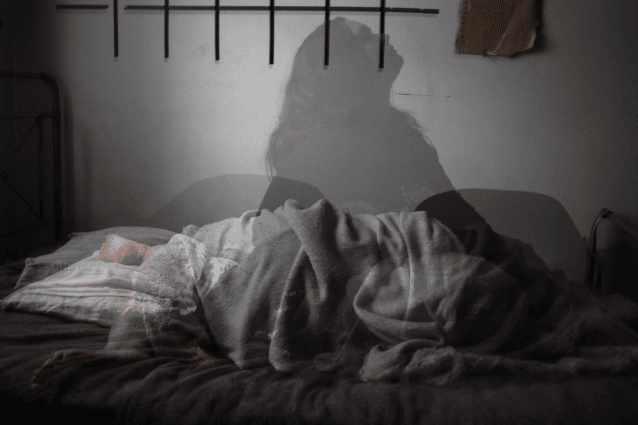Paradoxical sleep is one of the natural sleep stages. You might also know it as the rapid eye movement (REM) phase. This is when we dream.
It is also one of the most critical types of sleep. We need paradoxical sleep for our wellbeing. Not getting enough REM sleep could leave us physically and mentally exhausted.
This article will explain everything you need to know about paradoxical sleep:
- What it is and what is paradoxical about paradoxical sleep
- What happens during paradoxical sleep
- What paradoxical insomnia is
- What a paradoxical intention is
What Is Paradoxical Sleep?
Paradoxical sleep is the phase of sleep in which our eyes move in a rapid pattern, that is, the REM stage of sleep. It is different in many ways from the non-REM sleep phases, as you will discover shortly.
In the 1950s, researchers at the University of Chicago started exploring what was to become one of the major topics of sleep study today—REM sleep.
An exciting finding shows how much we truly need paradoxical sleep. When we are REM-deprived (when our sleep is interrupted at the REM stage), we should expect a REM rebound. This means that we will have a longer REM phase the next night to compensate for the loss.
In other words, we need to dream. We release our emotions, process stressful events, and incorporate new experiences into our minds. Dreams are vital for your body and soul.
What is paradoxical about paradoxical sleep?
REM sleep is also called paradoxical sleep because our brains are in a state that resembles being awake. On the other hand, we are particularly resilient to waking up.
Our body is limp because our muscles lose their tension. In other words, our bodies lie still. We are in a remarkably deep stage of the sleep cycle. We tend to be unaffected by noise, light, or touch.
The paradox, therefore, lies in the contrast between our mind’s high activity levels and the deeply relaxed body.
What Happens During Paradoxical Sleep?
As we said before, there are two types of sleep—non-REM and REM, or paradoxical, sleep.
Non-REM sleep has three different stages. Therefore, as the National Institute of Neurological Disorders and Stroke explains, there are four stages of sleep.
This cycle is repeated every 90 minutes or so:
- The first stage lasts for a few minutes. It is a transition from wakefulness to sleep.
- You spend most of your sleeping time in stage two, which is a phase of light sleep. Your body is relaxed, your body temperature drops, and brain waves slow down.
- The third stage is deep sleep, usually lasting for 20-40 minutes. You need perfect unbroken deep sleep so that you feel sufficiently refreshed in the morning.
- After these three non-REM stages, paradoxical REM sleep comes in. Your muscles are almost paralyzed so that you do not act out your dreams. Your brain waves, however, resemble those of a waking state. Similarly, your breathing becomes faster and more irregular. Your heart rate and blood pressure increase to near waking levels. Memory consolidation also most likely requires REM sleep.
Every phase of sleep is vital for your health. Sleep deprivation of any kind will put you at increased risk of severe health problems, including diabetes, heart diseases, and cancer. You are more prone to depression and anxiety and could also lose your libido and become disinterested in activities you usually enjoy.
What about paradoxical sleep deprivation? Research reveals that we need enough REM sleep to function optimally, both on physical and mental levels.
Suppose you are deprived of the REM phase. In that case, according to an extensive review, your mental and physical wellbeing can be jeopardized. You may become aggressive, irritable, or anxious. Focusing on a task could become extremely challenging. Your appetite and eating habits could change. Overall, you would not be your best self.
What Is Paradoxical Insomnia

Paradoxical insomnia, previously called “sleep state misperception” and “subjective insomnia,” is a subtype of insomnia. It is a type that is difficult to assess and treat using standard clinical methods.
People who have paradoxical insomnia underestimate the time and quality of their sleep. Objectively, there is no evidence of sleep deprivation. However, those affected feel as if they have severe insomnia. They would say that they slept much less than they did in reality.
Two common causes of paradoxical insomnia are stress and anxiety. These issues probably cause the person to be overly vigilant. In a way, distress prevents you from enjoying the benefits of restorative sleep.
This is why Marisa Peer’s Deep Sleep meditation could help you. It will guide you into a deep and restorative sleep. This meditation has been helping people around the world who struggle with insomnia or poor sleep quality achieve a sound, restful night’s sleep.
Listening to Marisa’s voice, your mind will release its alert or anxious energy. You will invite restorative sleep to come to you.Another of Marisa’s powerful products, Sound Sleeper, will help you get to the bottom of the cause of your insomnia. With insightful videos and practical activities, you will start to create a change in your thinking and, consequently, your sleep patterns. Over seven days, Marisa will walk you through every step you need to take to enjoy a solid and restful night’s sleep.
What Is Paradoxical Intervention?
Paradoxical intervention is a psychotherapeutic technique developed by Austrian psychiatrist and psychotherapist Victor Frankl. In paradoxical intervention, the client is asked to magnify and intentionally wish for the symptom or issue they struggle with.
For example, if you fear blushing when you speak to someone, you would be asked to blush as much as possible—intentionally. The paradoxical and humorous nature of such an attempt usually does the trick to liberate the client from their symptoms. Research supported the claims of its effectiveness in treating a range of psychological issues.
Paradoxical intervention is widely used in treating insomnia. According to scientific reviews, it is efficient and effective.
When you have insomnia and are trying hard to fall asleep, the opposite usually happens. The paradoxical intervention means trying NOT to fall asleep, and—you guessed it—the opposite tends to happen.
Ensure Great Sleep Quality for Wellbeing

Good sleep quality means sufficient paradoxical sleep. You need to dream in order for your mind and body to recuperate. In paradoxical sleep, your mind processes daily events and ongoing stresses.
Marisa Peer’s work provides you with fantastic tools to ensure excellent sleep quality, so you don’t need to wait any longer to begin your journey to better, restful sleep. Find the product that fits your needs best, and make the first step towards optimal health and wellbeing.



